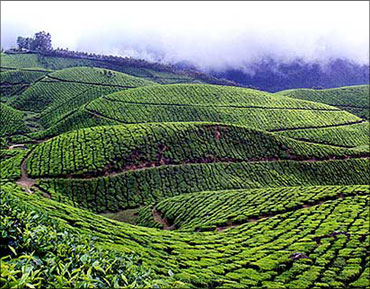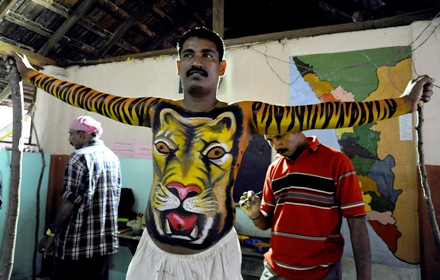 | « Back to article | Print this article |
Workers flock to Kerala in search of greener pastures
Kerala, which largely depends on remittances of around two million Malayalis working in the Gulf, has now become a thriving job market for workers hailing from Assam, West Bengal, Bihar and Orissa.
Though their exact numbers is not clear, the Labour department estimates them to be around 20 to 30 lakhs (2-3 million), which includes skilled, semi-skilled and unskilled hands.
Brought to the state by labour contractors, there are also those who come in search of better wages from Jharkhand, Chhattisgarh, Andhra Pradesh and Tamil Nadu, and are engaged in sectors like construction, hotels, footwear, plywood making, lottery selling and quarry and brick kilns.
Click NEXT to read further. . .
Workers flock to Kerala in search of greener pastures
Mahinder, a 28-year-old from Jharkhand, has been working as a supplier in a local hotel since over a year because he gets more pay than what he could expect in his home state.
"I earn around Rs 3,500 a month here. We used to get not more than Rs 1,000 in my state. Besides payment, we are given lodging and food. Many of my friends work in hotels and construction sites in Thiruvananthapuram and Kochi," he told PTI.
'Migrant workers,' as they are known here, are preferred by employers since their wages are cheaper compared to locals and there is a perception that they are willing to work harder and devote longer hours than the highly unionised native workers.
The trend that has been seen is that most men of the settlers work in construction and hotel sectors and quite a few women work in quarries and as domestic maids.
Click NEXT to read further. . .
Workers flock to Kerala in search of greener pastures
In the construction sector, labourers are paid at least Rs 250 a day, which is less than the Rs 450-500 demanded by locals.
The flow of professionals to IT campuses like Infopark and Technopark and the increasing demand for North Indian dishes has also caused the large-scale employment of cooks from the upper reaches of the country and the mushrooming of fast food joints.
A security dimension has also been seen as it is often difficult for employers to ascertain the nationality of the workforce, which sometimes include illegal immigrants from Nepal and Bangladesh.
Samar, who has migrated from West Bengal, works at a construction site near Technopark and says he saves a good chunk of his wages to send home to his family.
Click NEXT to read further. . .
Workers flock to Kerala in search of greener pastures
However, Anandi, a social researcher who studies migrant labour in Kerala believes that these workers are exploited by middlemen and job agents.
"Employers claim migrant labourers are provided reasonable pay or decent accommodation.
"The reality is that most of them, especially construction workers, sleep in shacks at worksites and are not provided enough food, clean drinking water or toilet facilities," she said.
Under the state's rules, each worker coming to Kerala has to register in a local labour office and agents who bring them have to pay Rs 1,000 refundable deposit per head.
But, labour contractors and middlemen manipulate the numbers to pay less bond amount, often making the exact count of number of migrants difficult.
Considering this, the Kerala government recently announced a plan to bring in a registration system for migrant job seekers.
Click NEXT to read further. . .
Workers flock to Kerala in search of greener pastures
"This will help us keep a databank of migrant workers coming to Kerala. It will also help state agencies keep a tab on them and ensure they are not exploited by contractors and employers," Labour Minister Shibu Baby John said.
"Under the scheme, we plan to give photo ID cards to such workers. Labour department staff now visit each work site, count the number of migrants and take their photos. We have already registered 20,000 labourers so far," he said.
The government also plans to set up labour camps in major cities like Thiruvananthapuram, Kochi and Kozhikode with the co-operation of employers.
Click NEXT to read further. . .
Workers flock to Kerala in search of greener pastures
Criminal cases involving outside workers and clashes with locals have also been reported in recent times.
Trade unions have been demanding that migrant workers be treated fairly, though they have yet organised them.
The workers' lifestyle can also be seen in Kerala's society and lifestyle, with eateries and wayside dhabas providing north Indian food to cater to their demands.
There are also instances of buses, hotels and shops displaying multi-lingual signboards in view of their growing presence in the state, researchers said.





